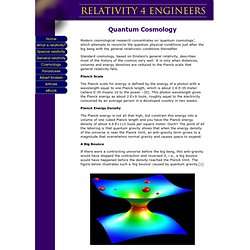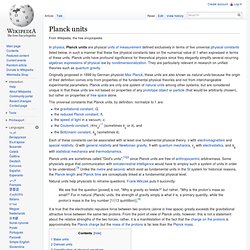

Quantum Cosmology. Modern cosmological research concentrates on 'quantum cosmology', which attempts to reconcile the quantum physical conditions just after the big bang with the general relativistic conditions thereafter.

Standard cosmology, based on Einstein's general relativity, describes most of the history of the cosmos very well. It is only when distances, volumes and energy densities are reduced to the Planck scale that general relativity fails. Planck Scale The Planck scale for energy is defined by the energy of a photon with a wavelength equal to one Planck length, which is about 1.6 E-35 meter (where E-35 means 10 to the power –35). Planck units. Originally proposed in 1899 by German physicist Max Planck, these units are also known as natural units because the origin of their definition comes only from properties of the fundamental physical theories and not from interchangeable experimental parameters.

Planck units are only one system of natural units among other systems, but are considered unique in that these units are not based on properties of any prototype object or particle (that would be arbitrarily chosen), but rather on properties of free space alone. The universal constants that Planck units, by definition, normalize to 1 are: the gravitational constant, G,the reduced Planck constant, ħ,the speed of light in a vacuum, c,the Coulomb constant, (4πε0)−1 (sometimes ke or k), andthe Boltzmann constant, kB (sometimes k).
Planck units are sometimes called "God's units",[1][2] since Planck units are free of anthropocentric arbitrariness. The Scale of the Universe. Scale of the Universe 2. Scale Of The Universe 2012. The Scale of the Universe 2. Space-time at the Planck scale is topologically... - CosmosPlasma. PlanckScale.pdf (application/pdf Object)